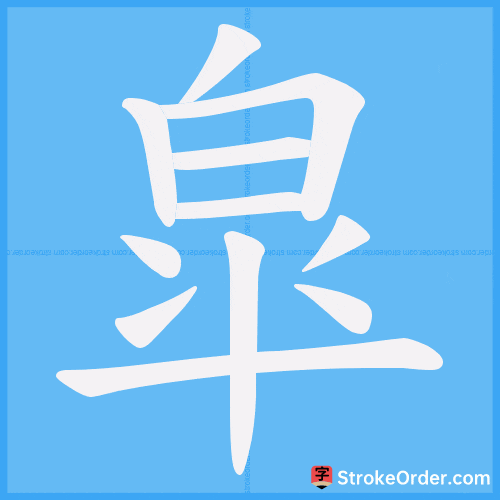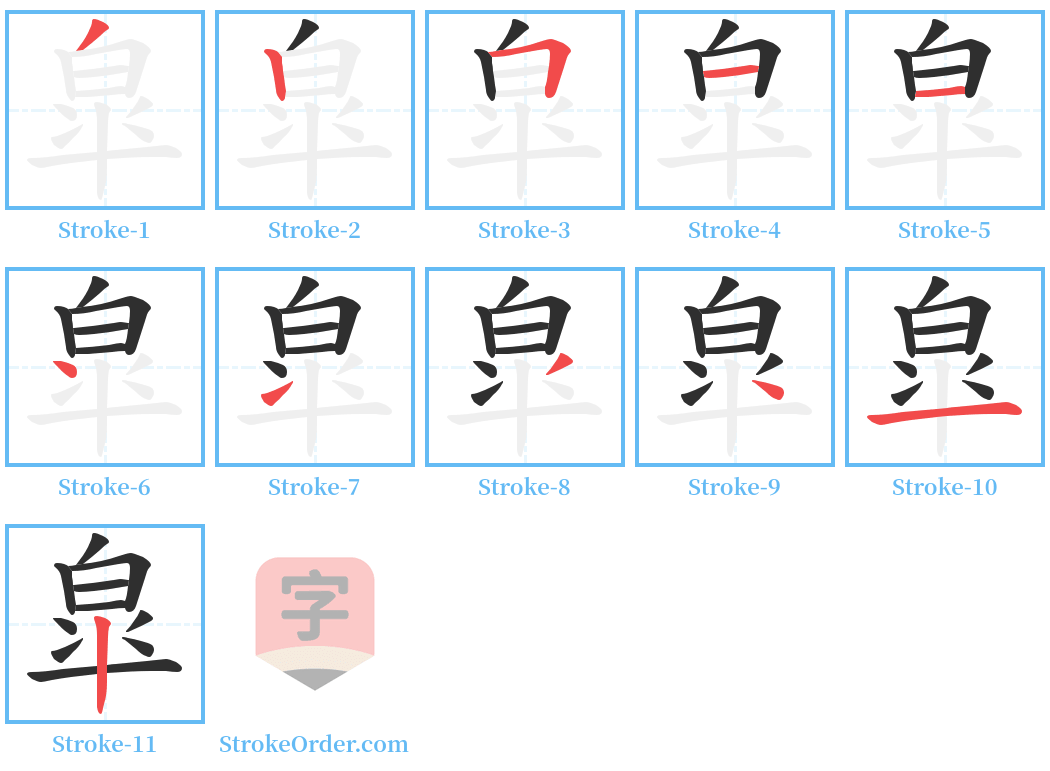皐 Stroke Order
Animated Stroke Order of 皐

Stroke Order Diagrams for 皐

Information of 皐
Pinyin
gāo、 yáo
Radical
白
Strokes
11 strokes
Usage
★★
Definition
皐 (gāo)
1. Same as “皋” (gāo).
2. Broadly refers to land beside the bank or water.
Example: "In the morning, the horses run by the banks of the river; in the evening, they cross the western shallows." — From "The Songs of Chu, Jiu Ge, Xiang Fu Ren".
Related terms:
- 皋渚 (gāo zhǔ) - land by the water.
- 皋陆 (gāo lù) - flat land by the water.
- 皋隰 (gāo xí) - low wet land by the water.
- 皋浒 (gāo hǔ) - high banks and water's edge.
- 皋壤 (gāo rǎng) - low land by marsh.
- 皋兰 (gāo lán) - orchid growing by the marshland.
Example: "The orchid lies on the path, the road gradually leads." — From "The Songs of Chu, Zhao Hun".
3. Marsh.
Example: "Cranes cry in the nine marshes, their sound is heard in the wild." — From "The Book of Songs, Xiao Ya, Her Ming".
Related terms:
- 皋泽 (gāo zé) - marshland.
- 皋薮 (gāo sǒu) - marshy land with abundant water plants.
- 皋壤 (gāo rǎng) - land near marshes.
- 皋原 (gāo yuán) - marshes and plains.
- 皋圃 (gāo pǔ) - pool and garden.
4. Rice fields.
Example: "Cultivating the fertile land of the eastern bank." — From "Wen Xuan, Pan Yue, Qiu Xing Fu".
5. Elevated land.
Example: "Climbing the eastern bank to stretch my voice, composing poetry by the clear stream." — From "Tao Qian, Gui Qu Lai Ci".
6. 皋比 (gāo bǐ). Refers to tiger skin; in ancient times, people sat on tiger skins to lecture. Later, it refers to a lecture seat.
Example: "Gongzi Yan secretly left from Yu Men, draping himself with a tiger skin and went to intervene first." — From "Zuo Zhuan, Zhuang Gong Ten Years".
7. Means "drum."
Example: 皋鼓 (gāo gǔ) - name of a large drum; 皋陶 (gāo táo) - wooden frame of a drum.
8. Means "high."
Example: 皋檠 (gāo qíng) - high lamp stand; 皋门 (gāo mén) - outer gate of the royal palace in ancient times.
9. An alternative name for the fifth month of the lunar calendar.
Example: 皋阴 (gāo yīn) - coldness of May.